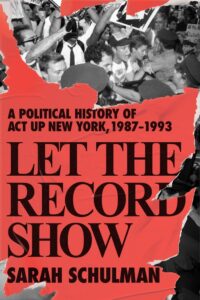
Our bundle of brilliant reviews this week includes Parul Sehgal on Sarah Schulman’s Let the Record Show, Sam Byers on Rachel Cusk’s Second Place, John Keene on Henry Dumas’ Echo Tree, Bryan Washington on Eric Nguyen’s Things We Lost to the Water, and Mark Whitaker on Niall Ferguson’s Doom.

“The effect is rather like standing in the middle of that large room, where anyone could speak up and share an idea. Everyone is talking; small stories branch off, coalesce pages later. Speakers shade in one another’s stories, offer another angle, disagree passionately. You turn a page, and the same people have their arms linked together at a protest. Shadows start to fall; in squares of gray text, deaths are marked, moments for remembrance. So many people leave the room … This is a book about the past, written in the fury of the present—in the midst of another epidemic—but its gaze is fixed on the future. Let the Record Show doesn’t seek to memorialize history but to ransack it, to seize what we might need. The dedication—’to us’—feels like an invitation: What are you doing with your Monday nights? This is not reverent, definitive history. This is a tactician’s bible … [Schulman’s] novels are bottled lightning. All grit and guns, cockeyed verbs—and the girls. Imagine if Patricia Highsmith hadn’t had to hide behind male characters, if Djuna Barnes’s hothouse flowers had to be at work (or frankly anywhere) in the morning, if Jean Rhys’s women drank themselves askew sitting on an upturned milk crate in the back of a seedy deli.”
–Parul Sehgal on Sarah Schulman’s Let the Record Show: A Political History of ACT UP New York, 1987-1993 (The New York Times)
“On the surface, then, this is a novel of glaring privilege, steeped in a mode of middle-class existence so rarified that the ‘lower things’ must never be allowed to intrude. This is, however, a Cusk novel, and in Cusk novels the surface, as experienced by reader and characters alike, invariably proves too fragile to be trusted. Second Place, it turns out, is a novel less about property, and more about the boundaries and misplaced emotional investment for which property is a proxy … The novel’s emotional nuance, its stylistic poise, has been as perfectly and painstakingly constructed as the life it describes, only to be blown apart by a flat and shattering statement, weighted around a central, immovable truth … Towards the end of the novel, the narrator says of L, whom she both admires and loathes, and by whom she knows herself to be loathed in turn: ‘He drew me with the cruelty of his rightness closer to the truth.’ We might say the same of Cusk, our arch chronicler of the nullifying choice between suffocation and explosion. Her genius is that in deliberately blurring a boundary of her own—that between a writer and her subject, between the expectation of autobiography so often attached to writing by women, and the carapace of pure invention so often unthinkably afforded to men—she tricks us into believing that her preoccupations and failings, her privileges and apparent assumptions, are not our own. By the time we realise what has happened, it is too late: our own surface has been disturbed, our own complacent compartment dismantled. It is a shock, but as the narrator of Second Place reminds us, ‘shock is sometimes necessary, for without it we would drift into entropy.’ Cusk is necessary too—deeply so, and Second Place, exquisite in the cruelty of its rightness, reminds us why.”
–Sam Byers on Rachel Cusk’s Second Place (The Guardian)
“Dumas and his generation of Black writers both in the United States and across the diaspora continued to grapple with fashioning new aesthetic models and forms to record and address the social and political transformations taking place around them, transformations they were participating in and effecting, while also honoring the past and pointing ways forward to an empowered, liberatory future … Dumas drew from a range of traditions, including realist, gothic, horror, and supernatural fiction, yet he also grounded his work in African and African American spirituality, folklore, and myths, drawn from oral and written traditions of storytelling, producing in the process what one might term an authentically Black, politically engaged ‘magical realism,’ while also creating early, signal examples of what would eventually come to be known as ‘Afrofuturism’…Dumas was, in effect, creating a counter-epistemology directly linked to the creativity, born of imagination, improvisation, and resistance, that was and remains crucial for the survival and self-determination of people of African descent in America and across the globe … Throughout, it is Dumas’s acute eye, his poetic ear, his assured narrative technique, his often otherworldly sense of humor, and his willingness to push the limits of conventional narrative that cast a spell on readers, leaving them with the twinned feeling of having read work that is both highly novel and yet imbued with something essential and familiar.”
–John Keene on Henry Dumas’ Echo Tree (The Baffler)
“New Orleans can be a sticky place to capture on paper. An attempt requires navigating multiple histories, and juggling physical boundaries with lore lodged bone-deep in the mud … Nguyen’s narrative strikes a very elusive balance: vast in scale and ambition, while luscious and inviting—enchanting, really—in its intimacy … Nguyen has created a revolving triptych of characters who, despite their closeness, or maybe even as a result of it, remain a paradox to one another … The result is both inviting and jolting. Nguyen’s characters exist within New Orleans’s myths—of mystery, splendor, pleasure—until they become inextricable from those narratives themselves … The hallmarks of gay fiction are present: the faltering of a trusted confidant, the mystery of first embraces, the finding of one’s self in others before reckoning within. But Nguyen never lets Ben’s youthful ardor override his skepticism, and there’s an honesty in him that neither overstays nor overextends … It’s a rare novel that conveys the vertigo of a journey without demystifying its individual turns, but Nguyen is an able captain, and the path he charts for us is illuminating.”
–Bryan Washington on Eric Nguyen’s Things We Lost to the Water (The New York Times Book Review)
“…reads like an extended version of one of those high-price talks … If you’ve ever attended a corporate retreat with a ‘thought leader’ speaker, or listened to enough TED talks online, you know the genre. Weaving together historical examples from across centuries and continents, illuminating statistics, intriguing academic research, and a few pop-culture references, these lectures have the effect of making audiences feel instantly smarter, without troubling them with the kind of soul-searching questions that might ruin a good night’s sleep or the conference cocktail party … In this fluid yet fleeting manner, Ferguson devotes the first third of his book to analyzing dozens of grand explanations for historical calamity, from religious eschatology to Marxist economics to the more modern innovations of ‘chaos theory’ and ‘cliodynamics,’ or the computer-driven attempt to decode historical patterns through massive data crunching. Like a good, Oxford-educated, small ‘c’ conservative, he finds them all interesting but ultimately wanting in their failure to acknowledge historical unpredictability and the limits of human foresight … Despite the pose of scholarly detachment that characterizes most of the book, Ferguson also betrays several striking biases in his closing chapters … History also offers many examples of the social and economic havoc that can result from such maddening inequality, but those stories may not go over so well with the well-heeled audiences that await Ferguson back on the speaking circuit. Safely vaccinated and wealthier than ever, they’d rather not picture that gray rhino.”
–Mark Whitaker on Niall Ferguson’s Doom: The Politics of Catastrophe (The Washington Post)


